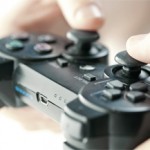Just like fastball pitches in baseball, balls can also fly 100 MPH in professional Ping-Pong, which is not exactly the same speed traveled when people play Ping-Pong in their basement.
He also dispels myths that Ping-Pong isn’t a sport because players don’t need to be in great shape.
“Twice a week, I drench two or three shirts and am out of breath from the moment I start playing until the moment I stop,” he says. “You move back and forth probably faster than you ever have. Ping-Pong is very aerobic.”
Dr. Magid has trained in China and Korea, and played in Paris and Amsterdam, as well as with the Olympic team in Iceland during vacations to these locations. Still, after winning his first trophy in a tournament in New York more than a decade ago, he stopped competing. Because his time is so valuable, he says he’d rather play while training than compete. At most tournaments, he says, a lot of time is wasted between games while people wait to compete.
Back home, he trains at one of the several Ping-Pong clubs in New York City. Although the sport hasn’t caught fire in the U.S. like it has in Asian and European countries, he believes that can change. He points to recent publicity generated for the game by American moguls and players Bill Gates and Warren Buffet.
Almost anyone can play—rich or poor. The sport has a low barrier to entry.
“I’ve met so many different kinds of people from all walks of life,” he says, pointing to his partial collection of friends who play Ping-Pong—a Holocaust survivor, a 2008 Ping-Pong Olympian and a Lebanese computer entrepreneur.
“It’s a blessing to belong to a community composed of people from all over the world, with different beliefs and languages,” says Dr. Magid. “I think it makes me a better person, a better doctor.”
Powers of Observation
Besides the game’s fun side, Ping-Pong has also helped Dr. Magid strengthen his physician skills by sharpening his observation skills and ability to focus and concentrate.
“At Cornell, they teach art to medical students,” he says explaining that students learn to observe a painting’s subtle clues to understand the story created by the artist. “In any profession, focus is important. With Ping-Pong, you have to drown out every extraneous thought or noise in the room and focus on the serve, the ball, and how you’re going to position yourself.”


